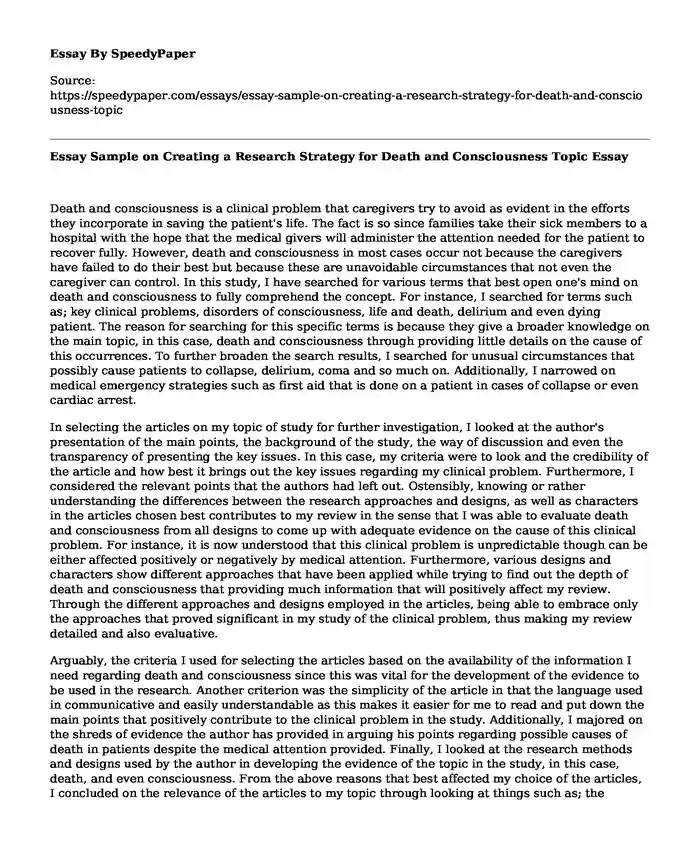Death and consciousness is a clinical problem that caregivers try to avoid as evident in the efforts they incorporate in saving the patient's life. The fact is so since families take their sick members to a hospital with the hope that the medical givers will administer the attention needed for the patient to recover fully. However, death and consciousness in most cases occur not because the caregivers have failed to do their best but because these are unavoidable circumstances that not even the caregiver can control. In this study, I have searched for various terms that best open one's mind on death and consciousness to fully comprehend the concept. For instance, I searched for terms such as; key clinical problems, disorders of consciousness, life and death, delirium and even dying patient. The reason for searching for this specific terms is because they give a broader knowledge on the main topic, in this case, death and consciousness through providing little details on the cause of this occurrences. To further broaden the search results, I searched for unusual circumstances that possibly cause patients to collapse, delirium, coma and so much on. Additionally, I narrowed on medical emergency strategies such as first aid that is done on a patient in cases of collapse or even cardiac arrest.
In selecting the articles on my topic of study for further investigation, I looked at the author's presentation of the main points, the background of the study, the way of discussion and even the transparency of presenting the key issues. In this case, my criteria were to look and the credibility of the article and how best it brings out the key issues regarding my clinical problem. Furthermore, I considered the relevant points that the authors had left out. Ostensibly, knowing or rather understanding the differences between the research approaches and designs, as well as characters in the articles chosen best contributes to my review in the sense that I was able to evaluate death and consciousness from all designs to come up with adequate evidence on the cause of this clinical problem. For instance, it is now understood that this clinical problem is unpredictable though can be either affected positively or negatively by medical attention. Furthermore, various designs and characters show different approaches that have been applied while trying to find out the depth of death and consciousness that providing much information that will positively affect my review. Through the different approaches and designs employed in the articles, being able to embrace only the approaches that proved significant in my study of the clinical problem, thus making my review detailed and also evaluative.
Arguably, the criteria I used for selecting the articles based on the availability of the information I need regarding death and consciousness since this was vital for the development of the evidence to be used in the research. Another criterion was the simplicity of the article in that the language used in communicative and easily understandable as this makes it easier for me to read and put down the main points that positively contribute to the clinical problem in the study. Additionally, I majored on the shreds of evidence the author has provided in arguing his points regarding possible causes of death in patients despite the medical attention provided. Finally, I looked at the research methods and designs used by the author in developing the evidence of the topic in the study, in this case, death, and even consciousness. From the above reasons that best affected my choice of the articles, I concluded on the relevance of the articles to my topic through looking at things such as; the number of points presented to support my topic. The evidence to support the points, the research findings of the clinical problem, and the type of resources used in the article.
A Search Strategy Template
Search terms Key clinical problems
Disorders of consciousness
Delirium
Life and Death
Dying patient
Databases searched Proquest Central
MEDLINE
PubMed
Web of Science
Scopus
PsychINFOEMBASE
Years of Search 1995-2018
Criteria for Selection Relevance
Research Approaches
Evidence
Explanation
Language
Language English
Articles Found Leisman, G., & Koch, P. (2009). Networks of conscious experience: computational neuroscience in understanding life, death, and consciousness. Reviews in the Neurosciences, 20(3-4), 151-176.
Lund, D. H. (2016). Death and consciousness. McFarland.
Parnia, S. (2014). Death and consciousness--an overview of the mental and cognitive experience of death. Annals of the New York Academy of Sciences, 1330(1), 75-93.
Turner-Stokes, L. (2014). Prolonged disorders of consciousness: new national clinical guidelines from the Royal College of Physicians, London. Clinical Medicine, 14(1), 4-5.
Turner-Stokes, L. (2017). A matter of life and death: controversy at the interface between clinical and legal decision-making in prolonged disorders of consciousness. Journal of medical ethics, 43(7), 469-475.
Cite this page
Essay Sample on Creating a Research Strategy for Death and Consciousness Topic. (2022, Jun 01). Retrieved from https://speedypaper.com/essays/essay-sample-on-creating-a-research-strategy-for-death-and-consciousness-topic
Request Removal
If you are the original author of this essay and no longer wish to have it published on the SpeedyPaper website, please click below to request its removal:
- Free Essay Sample on Inspiration for Writers
- What Has Shaped You as a Person Essay - Free Sample on SpeedyPaper
- National Security - Essay Example
- Free Essay - The Picture of Dorian Gray Summary
- Talking To Grief By Denise Levertov: Essay Sample to Check
- Free Essay: Major Attributes of the Portrayal of Nature in W. Wordsworth's Poetry
- Paper Example - Effects of the 9/11 Bout
Popular categories





